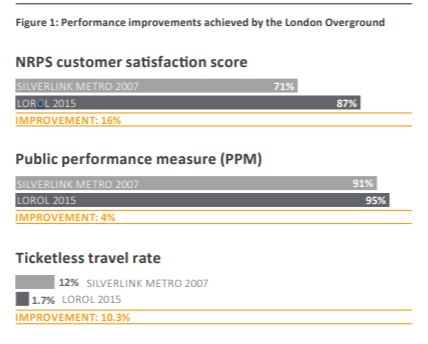Transport for London took over the West Anglia suburban services in May 2015 and is currently in the process of procuring the operator for the next London Overground concession from November 2016. In this article we comment on what Londoners can expect in the coming years.
In 2007, Transport for London (TfL) established London Overground and took over Silverlink Metro’s North London Line, West London line, London Euston Watford DC, and Gospel Oak-Barking services around London. London Overground Rail Operations Limited (LOROL) became the first operator of London Overground as a concession. Since then the network has expanded considerably, incorporating the East London Line, formerly part of London Underground, and the South London Line, to provide orbital movement around the capital. With West Anglia it now has 111 stations and served 176 million journeys last year.
London Overground has often been cited as a success story for the devolution of transport services. Figure 1 illustrates the performance improvements achieved.
TfL took over a network that was in poor condition. Through the concession model it has been able to influence directly the level of investment and customer experience – new and now longer trains, more frequent services, improved and more accessible stations, and much-improved customer information. Further improvements are planned for the West Anglia suburban routes, including new trains to be provided by Bombardier in 2018.
Under the concession model, TfL takes revenue risk and pays the operator to provide the service and the operator takes cost and performance risk. A study by London TravelWatch2 found that London Overground was perceived by users as a service for the benefit of Londoners, illustrated by customer comments such as “the train companies are all poor value for money due to the costs associated with privatisation but London Overground is run by TfL which is public so doesn’t have the same profit orientation”. The recent marketing slogan “TfL doesn’t make a profit because we reinvest all our income to run and improve your services” further reinforces the distinction from other train operating companies, although the London Overground operator, like any, would expect to provide services for a margin in return.
London Overground’s customers associate it more with London Underground rather than other train operating companies. Some also report that they pay lower fares due to TfL’s zonal fare structure and the orbital nature of its service.
As a consequence, customers’ expectations of London Overground, particularly in relation to service frequencies, can be higher than their expectations of other train operators, which means that customer satisfaction cannot be directly compared.
Given the success to date, further devolution of train services within Greater London (particularly south of the River Thames) continues to be assessed. However, bringing rail services up to London Overground standards comes at a cost. Only time will tell whether further devolution of London’s rail services could be achieved in the next concession but, as the network grows, individually coloured routes, rather than its distinct orange branding, could make the provision of customer information more effective.

